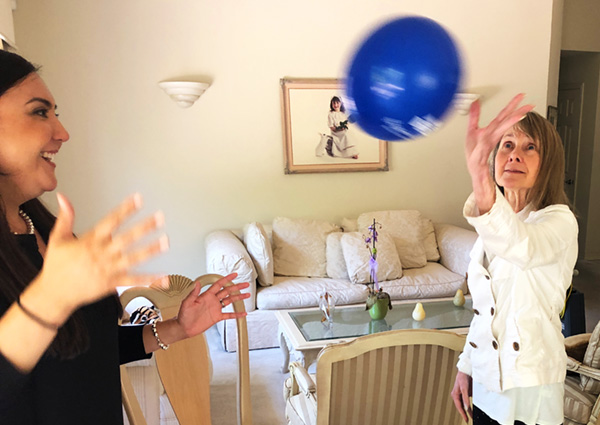- Stories & Testimonials
- Seniors
Four years ago Joan became one of the every six Americans diagnosed with Alzheimer’s disease each year. The 69 year-old’s symptoms progressed quickly and her husband of over three decades, Brian, retired early from his job in order to care for her while their adult daughter lives with them in their Foster City home for added support. But living on a fixed income while coping with the challenges of caring for their loved one with dementia proved more taxing than the family had imagined. As Joan’s dementia advanced, it became more difficult for her family to connect with her, taking an emotional toll on everyone. The family needed to find resources to help them communicate with Joan, but supportive services seemed out of reach with their already-tight budget.

Andrea Korsunsky, Director of JFCS’ Dementia Care Center, demonstrates a memory enhancement activity from the CONNECTivity Toolkit with her client, Joan.
Through a referral from a friend in the Jewish community Brian found JFCS’ Center for Dementia Care. The family qualified for fully subsidized services and Brian was grateful to discover such a program existed to help them navigate the path ahead.
Personalized Care—Now and in the Future
Like many people living with Alzheimer’s disease or other forms of dementia, Joan has significant difficulty with finding words to communicate and her family often struggles to understand her needs. Brian says, “The hardest part is seeing Joan’s communication skills decline. She tries to express herself, but her reality is different than anyone else’s.”
After Brian connected with JFCS’ Seniors At Home, Andrea Korsunsky, Director of the Center for Dementia Care, visited the family’s home to show them how good communication can be key to enhancing quality of life for a loved one with memory loss.
Initially the family was hesitant to include Joan, but Andrea emphasized the importance of her presence in the family discussion. She gently demonstrated ways to validate and engage Joan. Brian and their daughter talked about how Joan often becomes visibly frustrated, and Andrea role-played ways to anticipate her needs, show support through body language, and phrase things in a way to empathize with Joan’s frustrations.
New Toolkit Gives Hope for Connection
Andrea also brought with her the Center for Dementia Care’s recently launched toolkit, especially designed to help caregivers like Brian and his daughter.
The CONNECTivity Toolkit empowers families to enhance quality of life and enjoy time with their loved one who has Alzheimer’s disease or dementia. The toolkit’s contents are based on the latest research and combine activity-based intervention with clinical expertise. It is the only dementia toolkit of its kind.
Step-by-Step Guidance
A personalized consultation with a JFCS dementia expert is included with the toolkit and its contents support every stage of dementia. The toolkit guides families through verbal and nonverbal communication and sensory stimulation activities, as well as self-care strategies for caregivers.
“My wife gets frustrated trying to communicate, and that leads to us getting frustrated that she can’t express herself,” says Brian, who was relieved to have some activities he can do to engage his wife, “The toolkit is a pleasant diversion to fill in time where Joan is just pacing around the house.”
The family has been very grateful to receive expert dementia care support from JFCS through in-person consultations and by receiving the education and tools they needed to better communicate with Joan.
“Dementia is a difficult disease that affects everyone in the family,” says Andrea. “JFCS will be there for Joan’s family to provide services like a caregiver, counseling, and healthcare advocacy as the demands of caregiving change, but right now Joan has wonderful support from loving family and that’s a lot.”
JFCS’ services are funded by fees for services and by donations for those who cannot afford the full cost of care.
If you would like to make a donation, please contact Barbara Farber at [email protected], 415-449-3858, or click here to give online.
